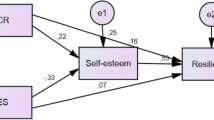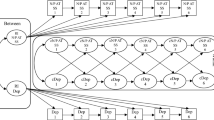Abstract
The present research aimed to examine the associations among automatic thoughts, psychological resilience, and integration into social life. The concept of integration into social life included adaptation, coping, and communication skills. This cross-sectional study was conducted with 450 secondary school students aged between 11 and 15 (M = 12.65; SD = 0.86), studying in a state secondary school in Turkey. The research group consisted of 234 female and 216 male students. Social Life Integration Scale, Children’s Automatic Thoughts Scale, and Short Psychological Resilience Scale were used as measures. According to the results, there were significant associations among automatic thoughts, psychological resilience, and integration into social life. In addition, social threat, personal failure, and hostility, the sub-dimensions of automatic thoughts, accounted for 26% of the total variance of integration into social life. Generally, automatic thoughts and psychological resilience can provide essential data to understand integration into social life among children. These findings were thought to contain practical information for experts in psychology and education.
Similar content being viewed by others

Data Availability
The datasets generated during and/or analysed during the current study are available from the corresponding author on reasonable request.
References
Atalan-Ergin, D. A., & Kapçı, E. G. (2013). Çocuk ve ergenlerde olumsuz bilişlerin değerlendirilmesi: Çocukların otomatik düşünceleri ölçeği’nin uyarlanması [Evaluation of negative cognitions in children and adolescents: Children’s automatic thoughts scale]. Bilişsel Davranışçı Psikoterapi ve Araştırmalar Dergisi, 2, 72–77.
Beck, A. T. (1976). Cognitive therapy and the emotional disorders. New American Library.
Beck, A. T. (1996). Beyond belief: A theory of modes, personality, and psychopathology. In P. M. Salkovskis (Ed.), Frontiers of cognitive therapy (pp. 1–25). Guilford Press.
Beck, J. S. (2020). Cognitive behavior therapy: Basics and beyond (3rd ed.). Guilford Press.
Brown, T., Yu, M. L., & Etherington, J. (2021). Listening and interpersonal communication skills as predictors of resilience in occupational therapy students: A cross-sectional study. British Journal of Occupational Therapy, 84, 42–53.
Caqueo-Urízar, A., Urzúa, A., Escobar-Soler, C., Flores, J., Mena-Chamorro, P., & Villalonga-Olives, E. (2021). Effects of resilience and acculturation stress on integration and social competence of migrant children and adolescents in Northern Chile. International Journal of Environmental Research and Public Health, 18, Article e2156.
Çıkrıkçı, N. (2020). Determination of intermediary and interactional roles of resilince between motivational factors and social life integration components in eary-adolescents [Unpublished doctoral dissertation]. Trabzon University
Çıkrıkçı, N., & Çıkrıkçı, Ö. (2022). Bedensel engelli bireylerin dünyasından sosyal hayata entegrasyon [Social life integration from the world of psychically disabled people]. Milli Eğitim Özel Eğitim ve Rehberlik Dergisi, 2, 92–121.
Clarke, I., & Nicholls, H. (2018). Third wave CBT integration for individuals and teams: Comprehend, cope and connect. Routledge.
Coleman, J. C. (2023). Relationships in adolescence. Routledge.
Değer, B. (2019). Adjustment problems of gifted children and relations with labeling and coping mechanisms of stress [Unpublished master’s thesis]. Ege University.
Demir, S., & Ercan, F. (2022). The effectiveness of cognitive behavioral therapy-based group counseling on depressive symptomatology, anxiety levels, automatic thoughts, and coping ways turkish nursing students: A randomized controlled trial. Perspectives in Psychiatric Care, 58, 2394–2406.
Doğan, T. (2015). Kısa psikolojik sağlamlık ölçeği’nin Türkçe uyarlaması: Geçerlik ve güvenirlik çalışması [Adaptation of the brief resilience scale into turkish: A validity and reliability study]. The Journal of Happiness & Well-Being, 3, 93–102.
Eshel, Y., Kimhi, S., Marciano, H., & Adini, B. (2022). Perceived partial social integration, levels of distress and resilience, and COVID-19 vaccine rejection of jewish and arab citizens of Israel. Frontiers in Public Health, 10, Article e1021015.
Gizir, S. (2007). Üniversitelerde örgüt kültürü ve örgüt-içi iletişim üzerine bir derleme çalışması [A review on organizational culture and organizational communication in universities]. Kuram ve Uygulamada Eğitim Yönetimi, 50, 247–268.
Huang, D., Lin, W., Luo, Y., & Liu, Y. (2022). Social Capital, Resilience and Social Integration of chinese migrant children. Journal of Social Service Research, 48, 214–225.
Irfan, S., & Zulkefly, N. S. (2023). Parent-peer attachment, negative automatic thoughts and psychological problems among pakistani adolescents: A moderated mediation model. Current Psychology, 42, 1979–1995.
Irfan, S., Zulkefly, N. S., Aun, T. K., & Ismail, S. I. F. (2019). The role of negative automatic thoughts as a Mediator in the relationship between maternal attachment and depressive symptoms among late adolescents of Pakistan. Malaysian Journal of Medicine and Health Sciences, 15, 21–29.
Kamis, C., & Copeland, M. (2020). The long arm of social integration: Gender, adolescent social networks, and adult depressive symptom trajectories. Journal of Health and Social Behavior, 61, 437–452.
Kerstis, B., Åslund, C., & Sonnby, K. (2018). More secure attachment to the father and the mother is associated with fewer depressive symptoms in adolescents. Upsala Journal of Medical Sciences, 123, 62–67.
Maktoof, S. Y. (2021). Social integration and its relationship to psychological resilience among displaced university students. Journal of Tikrit University for Humanities, 28, 372–392.
Sabanci, Y., & Çekiç, A. (2019). The relationship between irrational beliefs, resilience, psychological needs, cyberbullying and cyber victimization. Universal Journal of Educational Research, 7, 700–706.
Schniering, C. A., & Rapee, R. M. (2002). Development and validation of a measure of children’s automatic thoughts: The Children’s Automatic Thoughts Scale. Behaviour Research & Therapy, 40, 1091–1109.
Schniering, C. A., & Rapee, R. M. (2004). The structure of negative self-statements in children and adolescents: A confirmatory factor-analytic approach. Journal of Abnormal Child Psychology, 32, 95–109.
Smith, B. W., Dalen, J., Wiggins, K., Tooley, E., Christopher, P., & Bernard, J. (2008). The brief resilience scale: Assessing the ability to bounce back. International Journal of Behavioral Medicine, 15, 194–200.
Tudor-Hart, B. (2023). Learning to live: Understanding the child from birth to adolescence. Taylor & Francis.
Versteeg, M., Kappe, R. F., & Knuiman, C. (2022). Predicting student engagement: the role of academic belonging, social integration, and resilience during COVID-19 emergency remote teaching. Frontiers in Public Health,10, Article e849594.
Yu, M., Huang, L., Mao, J., & Luo, S. (2022). Childhood maltreatment, automatic negative thoughts, and resilience: The protective roles of culture and genes. Journal of Interpersonal Violence, 37, 349–370.
Funding
There was no any financial support from any agency to conduct this research work.
Author information
Authors and Affiliations
Corresponding author
Ethics declarations
Ethics approval and consent to participate
The ethical suitability of the study was approved by the Social and Human Sciences Research Ethics Committee of the university where the first researcher works. Additionally, all procedures performed in studies involving human participants were in accordance with the ethical standards of the institutional research committee and with the 1964 Helsinki declaration and its later amendments or comparable ethical standards.
Competing interests
The author(s) declare no potential conflicts of interest with respect to the research, authorship, and/or publication of this article.
Additional information
Publisher’s Note
Springer Nature remains neutral with regard to jurisdictional claims in published maps and institutional affiliations.
Rights and permissions
Springer Nature or its licensor (e.g. a society or other partner) holds exclusive rights to this article under a publishing agreement with the author(s) or other rightsholder(s); author self-archiving of the accepted manuscript version of this article is solely governed by the terms of such publishing agreement and applicable law.
About this article
Cite this article
Yıldırım, T., Çıkrıkçı, Ö. & Çıkrıkçı, N. Predicting Social Life Integration Based on Automatic Thoughts and Resilience Among Children and Adolescents. J Rat-Emo Cognitive-Behav Ther (2023). https://doi.org/10.1007/s10942-023-00525-y
Accepted:
Published:
DOI: https://doi.org/10.1007/s10942-023-00525-y



